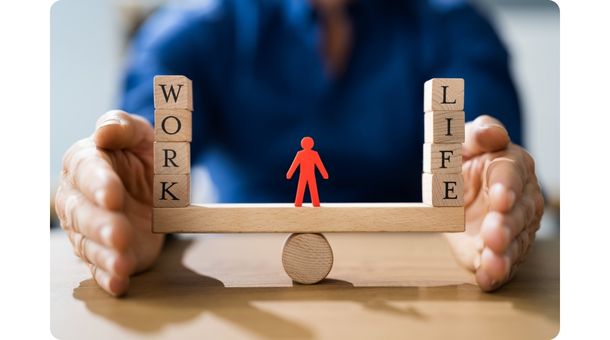In today’s fast-paced world, achieving a balanced lifestyle has become a cherished aspiration for many.
“Striking a Balance: The Art of a Balanced Lifestyle” explores the delicate equilibrium between work, personal life, and self-care.
In this article, I will completely explain to you the principles, strategies, and benefits of leading a well-balanced life, Join me on this journey to discover the art of a balanced lifestyle.
What is a balanced lifestyle?
A balanced lifestyle is a way of living that involves effectively managing and harmonizing various aspects of your life to achieve overall well-being and contentment.
It involves finding equilibrium between different dimensions of your existence, including work, relationships, personal development, and self-care.
In a balanced lifestyle, you allocate time, energy, and attention to each of these areas in a way that minimizes stress, fosters physical and mental health, enhances productivity, and promotes a sense of fulfillment.
This may involve setting boundaries, setting priorities, and ensuring that you engage in activities that nourish your body, mind, and spirit.
Importance of a balanced lifestyle
- Balance in life is important for various reasons.
- Reduces stress and anxiety, enhancing mental well-being.
- Promotes physical health through exercise, nutrition, and rest.
- Improves productivity by preventing burnout and distractions.
- Strengthens relationships and fosters fulfillment.
- Enhances time management and creativity.
- Increases resilience and holistic growth.
- Offers long-term health benefits and overall well-being.
How you can start your journey toward a balanced life?

Starting your journey toward a balanced life is a valuable endeavor that can lead to increased well-being and fulfillment.
Here I am highlighting some steps that can help you to get started your journey toward a balanced lifestyle.
Self-Reflection
Begin by reflecting on your current lifestyle and identifying areas where you feel imbalanced or overwhelmed.
Set Clear Goals
Define what balance means to you. What are your priorities in life, and what do you want to achieve in terms of work, relationships, personal growth, and self-care?
Prioritize
Determine your most important values and life priorities. This will help you allocate your time and energy in a way that aligns with what matters most to you.
Time Management
Develop effective time management skills. Create schedules, set deadlines, and use tools like calendars or task lists to help you organize your time.
Establish Boundaries
Clearly define your boundaries at work and in your personal life, and communicate these boundaries to others. This will help prevent overcommitting and maintain your balance.
Practice Self-Care
Dedicate time to self-care activities that nurture your physical and mental well-being. This may include exercise, relaxation, mindfulness, and pursuing hobbies or interests that bring you joy.
Learn to Say ‘No’
Be selective about your commitments and learn to say “no” to requests or activities that don’t align with your priorities.
Quality Over Quantity
Focus on the quality of your work and experiences, rather than trying to do too much. Prioritize depth and meaning over sheer volume.
Regular Evaluation
Periodically assess your progress and make adjustments to your goals and strategies as needed. Reflect on what’s working and what isn’t.
Seek Support
Share your goals and journey with trusted friends, family, or a mentor who can provide guidance, encouragement, and accountability.
Balance in All Areas
Strive for balance in all key areas of your life, including work, relationships, personal growth, and self-care
Celebrate Achievements
Acknowledge and celebrate your achievements along the way to maintain motivation and recognize your progress.
Be Patient
Understand that achieving balance is an ongoing process, and it’s okay to make gradual improvements. Be kind to yourself as you make these changes.
Adapt and Evolve
Life circumstances change, so be willing to adapt your strategies and goals to maintain balance as your situation evolves.
What are the effects of poor work-life balance?

Poor work-life balance can have several negative effects on your physical, mental, and emotional well-being, as well as on your personal and professional life.
Here are Some common effects of poor work-life balance:
- Burnout: Excessive work demands can lead to burnout, characterized by physical and emotional exhaustion, reduced performance, and a sense of detachment from work.
- Stress: A lack of balance can result in chronic stress, leading to anxiety, depression, and a decline in mental health.
- Physical Health Issues: Poor work-life balance may contribute to physical health problems like fatigue, sleep disturbances, weight gain, and an increased risk of chronic illnesses, such as heart disease.
- Strained Relationships: Neglecting personal and family life can strain relationships and lead to conflicts and a sense of isolation from loved ones.
- Reduced Productivity: Overworking and stress can lead to reduced productivity, as it becomes challenging to focus and perform at your best.
- Career Consequences: Paradoxically, poor work-life balance can hinder career advancement by limiting your capacity to innovate, collaborate, and take on new challenges effectively.
- The decline in Overall Well-Being: An imbalance can result in lower life satisfaction, reduced engagement in activities you enjoy, and a sense of missing out on personal fulfillment.
- Ineffective Time Management: Poor work-life balance can lead to inefficient use of time, with consequences for personal and professional goals.
- Lack of Self-Care: Neglecting self-care can have detrimental effects on your mental and physical health, leading to increased stress and health problems.
- Unfulfilled Personal Goals: You may struggle to achieve personal goals or engage in meaningful hobbies and interests when work dominates your life.
- Difficulty Disconnecting: Constantly being connected to work through technology can make it difficult to truly disconnect and relax during personal time.
Conclusion
poor work-life balance can have a significant impact on your well-being, affecting your physical and mental health, personal relationships, and even your career. Recognizing the signs of imbalance is the first step toward addressing these issues.
By taking proactive steps to restore equilibrium, such as setting boundaries, practicing self-care, and managing your time effectively, you can improve your overall quality of life and well-being.
FQA
What are the common signs of poor work-life balance?
Common signs include chronic stress, burnout, strained relationships, and decreased productivity.
Can poor work-life balance impact your career?
Yes, it can hinder career advancement by limiting your ability to innovate, collaborate effectively, and maintain peak performance at work.
Is it possible to reverse the effects of poor work-life balance?
Yes, by implementing strategies for better balance, addressing stress, and prioritizing self-care, you can gradually reverse the negative effects and regain a healthier equilibrium in life.
How can I recognize if I have a poor work-life balance?
Warning signs include constant fatigue, difficulty disconnecting from work, strained relationships, and a general sense of dissatisfaction with your work and personal life.
Striking a Balance: The Art of a Balanced Lifestyle Striking a Balance: The Art of a Balanced Lifestyle Striking a Balance: The Art of a Balanced Lifestyle Striking a Balance: The Art of a Balanced Lifestyle Striking a Balance: The Art of a Balanced Lifestyle

